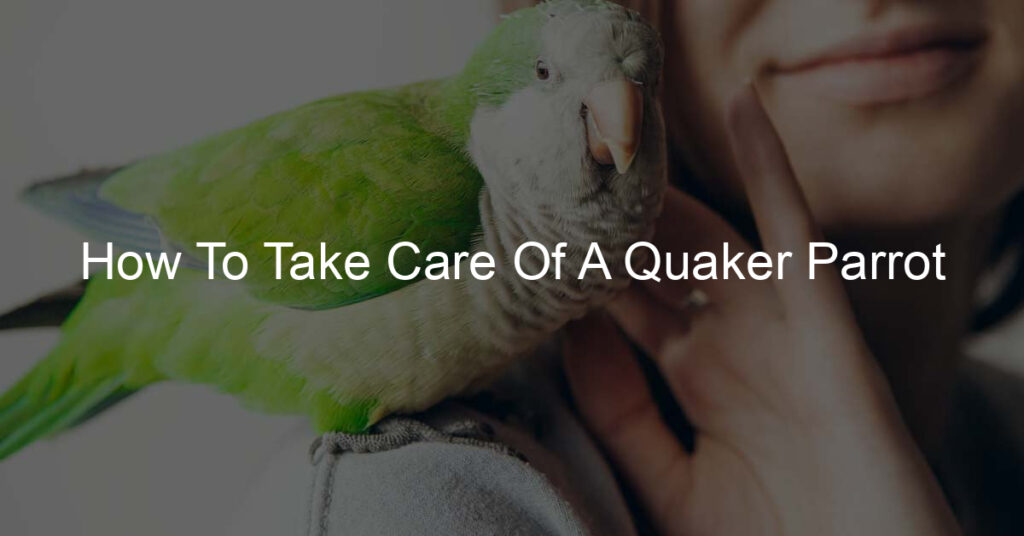How to Care for a Quaker Parrot: A Guide For First-Time Owners
Quaker parrots, also known as bald eagles or monk parrots, are intelligent birds that have a wide range of vocalizations. If you’re thinking about bringing home one of these magnificent creatures as your new avian companion, there are quite a few things you’ll need to know before doing so. In this guide, we’ll take you through the ins and outs of what it takes to care for a Quaker Parrot properly. To get started, keep reading to find out everything you should know about keeping a Quaker Parrot as your pet!
Quaker Parrot Care Basics
Before we get into the nitty-gritty details, let’s cover some general care basics for Quaker Parrots. These birds make excellent pet companions for advanced owners, who are ready and able to give their parrot all the care it needs.
What is a Quaker Parrot?
Quaker parrots are part of the species Psittacula Quaker or the genus “monachus,” depending on who you ask. These birds are native to South America, Central America, and the Caribbean. They are large parrots, with males growing up to be around 18 inches long and females growing to be about 16 inches. They have a very long lifespan, with some living up to 80 years. Quakers are very social birds and are best kept as pairs or small groups. They get lonely when they’re alone, and they can become aggressive or destructive as a result. Quakers are also very loud birds and produce a lot of noise while they’re exploring their environment and while they’re vocalizing.
How to Choose a Healthy Quaker Parrot
Before you bring your new feathered friend home for the first time, you’ll want to make sure you’re bringing home a healthy bird. To do this, you’ll need to know how to pick a healthy Quaker Parrot. First, ensure you’re visiting a reputable and responsible pet store or breeder who has thoroughly vetted their birds for health. Next, inspect the bird for obvious signs of illness — such as a bloated stomach, flaky skin, or discolored feathers — which can be signs of internal parasites. Then, look for obvious signs of health problems the bird might have, such as a crooked beak (which can be a sign of a metabolic condition called macaw beak), a lethargic demeanor, or trouble climbing. As a general rule of thumb, you want to ensure you’re bringing home a bright-eyed, perky, and healthy-looking bird.
Quaker Parrot Food and Diet
Quaker parrots are intelligent birds that need a specific diet to stay healthy and happy. If you’re bringing home a Quaker Parrot for the first time, make sure you’re feeding it a diet that meets all of its nutritional needs. As a rule of thumb, you should feed your Quaker Parrot a diet made up of about 80% pellets and 20% fruits and vegetables. To ensure that your parrot is getting the right nutrients, make sure that the pellets you’re feeding it are made for parrots, contain a high percentage of seeds and grains, and are free of any artificial additives.
Housing Requirements for Quaker Parrots
Quaker Parrots need a spacious and stimulating environment to thrive. If you’re housing your parrot indoors, you’ll want to make sure to provide it with plenty of toys and perches, as well as plenty of space to move around in. It’s best to house your parrot in a large, open room, or even a large aviary if you can. Quaker parrots are messy and loud birds. Because of this, it’s best to keep them in a room that has easy-to-clean surfaces, such as a tiled room or a room with laminate flooring. You’ll also want to make sure that any room you keep your parrot in is well-ventilated, so the parrot can stay cool, and free from noise pollution.
Conclusion
If you’re ready to make a commitment to a long and happy life for your new feathered friend, then a Quaker Parrot might be the perfect choice for you. Quakers are intelligent birds that thrive when they have plenty of room to play and explore and have plenty of toys and perches to rest on. If you’re prepared for the high level of care and noise that comes with owning a Quaker Parrot, you’re well on your way to bringing home a healthy, happy avian companion.








